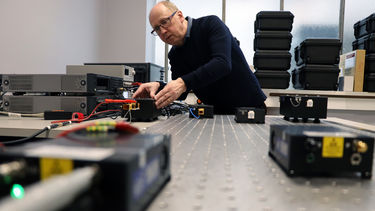- University of Sheffield academic Professor Timothy O’Farrell FREng has been awarded a prestigious Research Chair to help develop the sixth generation (6G) of mobile networks
- Awarded by the Royal Academy of Engineering, Professor O’Farrell will work with industrial sponsor Keysight Technologies to address key challenges in the development of 6G
- Professor O’Farrell is set to develop new waveform techniques that will be key to communicating via 6G’s huge radio frequency range
- The University of Sheffield is one of the UK’s leading universities for 6G research and development - home to the UK’s first National 6G Radio Systems Facility
A University of Sheffield professor is set to play a key role in developing the next generation of mobile networks - 6G - after being awarded a new Research Chair from the Royal Academy of Engineering.
Professor Timothy O’Farrell FREng, from the University’s School of Electrical and Electronic Engineering, will work closely with industrial sponsor Keysight Technologies to overcome key challenges in realising the technology, which promises much faster speeds than current 5G networks as well as improved energy performance and accessibility.
Through a new research programme, Professor O’Farrell aims to develop new waveforms based on convention and machine learning techniques that are key to successfully transmitting radio signals via 6G’s huge frequency range.
Previous generations of mobile networks, including 4G and 5G, have standardised a single waveform. However, the challenging mix of operating environments used in 6G prohibits this same single-waveform approach. Instead, a solution that uses a group of different waveforms is proposed, where selecting which one to use depends on the application and operating environment. Currently, the techniques are still to be perfected to ensure 6G networks are efficient once rolled out.
Professor O’Farrell will work closely with Keysight’s 6G Program Manager Roger Nichols and his team based in Santa Rosa CA to address these challenges, which are set to redefine signal processing in radio systems and help bring 6G networks closer to launch.
On being awarded the Chair, Professor O’Farrell said: "I am delighted to have been awarded a Royal Academy of Engineering Research Chair to carry out world leading research on 6G networks. 6G will be an important technology in people's lives beyond 2030. I look forward to working with Keysight Technologies on our ambitious research programme to help determine the 6G air interface."
The Royal Academy of Engineering’s Research Chairs and Senior Research Fellowships scheme aims to strengthen the links between industry and academia, supporting academics in UK universities to undertake use-inspired research to meet the needs of industrial sponsors. The scheme helps to enhance world leading engineering research, such as the 6G research at Sheffield. View the Royal Academy of Engineering's announcement of Professor Timothy O'Farrell's Research Chair Award.
The University of Sheffield is one of the UK’s leading universities for 6G research and development. Earlier this year, Sheffield officially launched the UK’s first National 6G Radio Systems Facility sponsored by Keysight to bring academics and industry together for 6G R&D, establish a vibrant research community and support the UK in its ambition to become a world leader in 6G technology.




